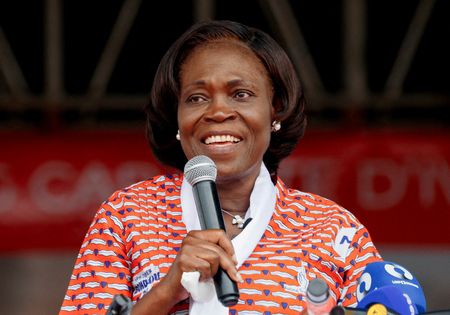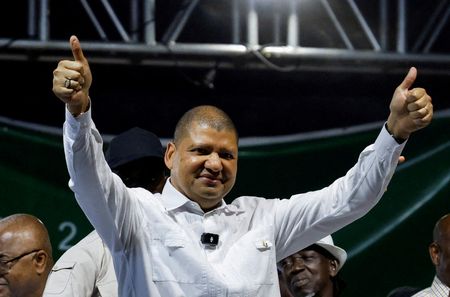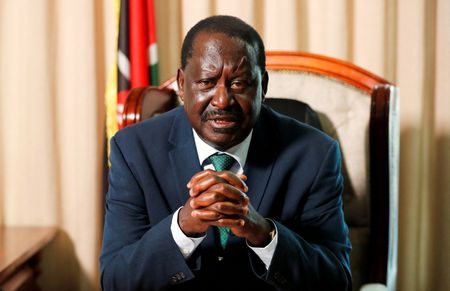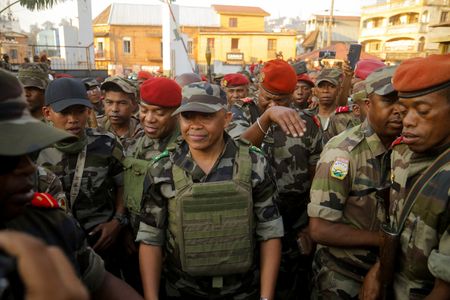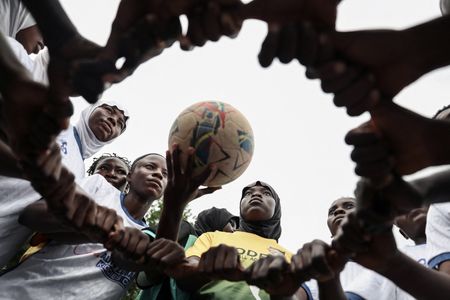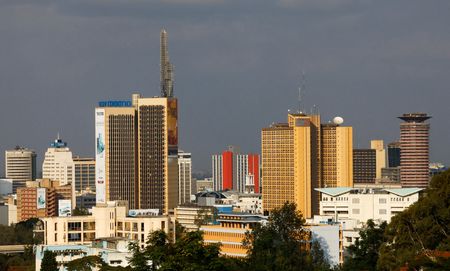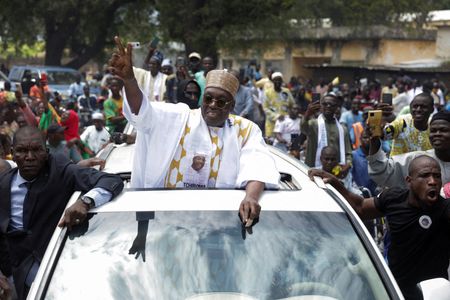ABIDJAN (Reuters) -Following are details of the main opposition challengers to Ivory Coast’s President Alassane Ouattara, who is running for a fourth term in an election scheduled for October 25. The West African nation is the world’s biggest cocoa producer.
SIMONE GBAGBO
Gbagbo, 76, was Ivory Coast’s first lady during the tumultuous tenure of her then-husband Laurent Gbagbo, who led the country during a civil war between 2002 and 2007. After losing to Ouattara in the 2010 election, he refused to step down, triggering another conflict.
Four months later, in early April 2011, Laurent and Simone Gbagbo were arrested together at their Abidjan residence, ending the post-election fighting that had killed around 3,000 people.
Simone Gbagbo was charged at the International Criminal Court in The Hague for alleged crimes related to the conflict, but Ouattara’s government refused to transfer her. Instead she went on trial at home and in 2015 received a 20-year sentence for crimes against the state.
Ouattara granted her an amnesty in 2018.
Simone and Laurent Gbagbo divorced in 2023, formally ending a political alliance that dated back to the era of Felix Houphouet-Boigny, Ivory Coast’s founding president.
Gbagbo is now head of the Movement of Skilled Generations party formed in 2022. At her first election rally on Saturday, she said infrastructure projects under Ouattara were positive but that Ivorians were clamouring for better health care and job opportunities.
JEAN-LOUIS BILLON
Billon, 60, is representing the Democratic Congress, a new grouping of 18 parties and political movements.
A former trade minister, Billon had sought unsuccessfully to become the standard-bearer for the main opposition PDCI party this year after its leader, former Credit Suisse CEO Tidjane Thiam, was barred from running.
Analysts say Thiam would have posed the biggest threat to Ouattara, but a court ruled in April that he should be removed from the electoral roll because he was a French national when he registered. Ivory Coast law states that candidates must be Ivorian citizens and cannot hold another nationality.
In an interview with Reuters in June, Billon said that if elected he would endorse a law to lift restrictions on dual nationality.
He also said he would trim the civil service, crack down on corruption, promote private sector investment and move more government offices to Yamoussoukro, the political capital.
Billon has said it is time for Ouattara, 83, and other politicians of his generation to leave the scene.
AHOUA DON MELLO
A former protege of Laurent Gbagbo who served as his spokesperson during the 2010-11 election crisis, Don Mello is running this year as an independent.
Gbagbo’s political party, the African People’s Party of Ivory Coast (PPA-CI), kicked Don Mello out after he decided to run for president.
Laurent Gbagbo himself is barred from running because of a prior conviction, and his party does not have a candidate in the October 25 contest.
Don Mello, 67, has argued that it is important to formally participate in the election to avoid a repeat of 2020, when the opposition boycotted the presidential poll and Ouattara won with 94% of the vote.
He has called for abandoning the euro-pegged CFA franc and for revising Ivory Coast’s defence agreements including with former colonial power France.
Critics accuse him of pushing a pro-Russia agenda, but in an interview with France 24 this month he denied he was “Vladimir Putin’s man”.
HENRIETTE LAGOU ADJOUA
A former minister of social affairs and of women, families and children, Adjoua, 66, also ran against Ouattara in the 2015 election, earning less than 1% of the vote.
She has pitched herself as a champion of “centrist” values emphasising peace and reconciliation, saying at a campaign event on Monday that “the wounds of the past have not disappeared”.
Adjoua represents the Group of Political Partners for Peace, a collection of centrist parties, and is a vocal campaigner for more women in politics including in a book published this year titled “Why Not a Woman?”
(Reporting by Loucoumane CoulibalyWriting by Robbie Corey-BouletEditing by Frances Kerry)

